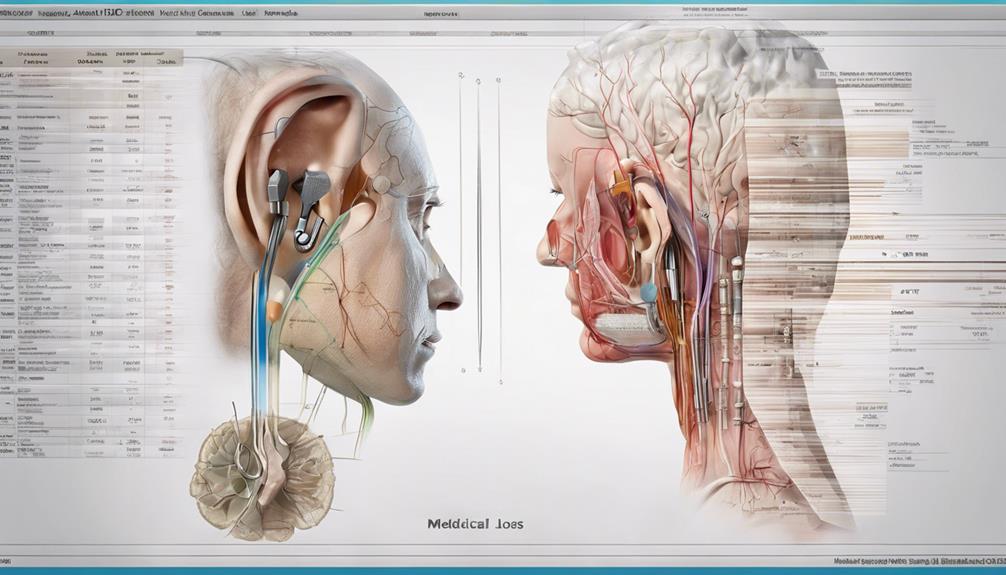Emerging research shows blood biomarkers could soon help detect hearing loss before symptoms appear. Scientists are identifying molecules and proteins linked to ear damage, inflammation, and nerve degeneration that serve as biological indicators of hearing decline. Advances in testing technologies improve early, non-invasive diagnosis, paving the way for personalized treatments. While still developing, these insights promise to transform how hearing health is monitored and managed—learn more about what’s on the horizon.
Key Takeaways
- Emerging research identifies specific blood proteins and molecules linked to cochlear damage and neural degeneration as potential hearing loss biomarkers.
- Advances in blood test technology improve sensitivity and specificity for early, non-invasive detection of auditory decline.
- Blood biomarkers related to inflammation and oxidative stress are being studied as indicators of ongoing ear tissue damage.
- Genetic and molecular markers in blood are contributing to personalized diagnostics and targeted interventions for hearing impairment.
- Challenges remain in standardizing biomarker thresholds and expanding diverse population studies for widespread clinical use.
Understanding Blood Biomarkers and Their Role in Hearing Health

Blood biomarkers are measurable substances in your blood that can reveal important information about your hearing health. They reflect underlying processes related to ear anatomy, such as hair cell damage or inflammation. Unlike traditional tests, blood biomarkers can provide insights into early cochlear or auditory nerve changes before symptoms appear. While audiometry techniques remain essential for detecting hearing loss, blood tests offer a non-invasive way to identify biological signs of auditory decline. By analyzing specific molecules and proteins, researchers aim to develop blood-based diagnostics that complement audiometric results. This integrated approach could lead to earlier detection and personalized treatments, helping you manage hearing health more effectively. Understanding these biomarkers is a promising step toward better prevention and intervention strategies for hearing loss. Additionally, ongoing research into blood biomarker detection is crucial for advancing non-invasive diagnostic tools in audiology.
Key Molecules and Proteins Associated With Auditory Decline

Several key molecules and proteins have emerged as indicators of auditory decline, providing insights into the biological processes underlying hearing loss. These molecules often participate in specific molecular pathways involved in cochlear health and auditory nerve function. For example, elevated levels of certain auditory proteins, like neurotrophins, signal nerve damage or degeneration. Additionally, proteins associated with oxidative stress and inflammation—such as cytokines—highlight ongoing cellular damage. Understanding these molecules helps clarify how molecular pathways contribute to auditory decline, revealing potential targets for intervention. Recognizing these key proteins and their roles enables researchers and clinicians to identify early signs of hearing loss and monitor disease progression more effectively, making them essential components in the quest for blood-based biomarkers for auditory health. Moreover, research into vetted mother baby kids products can inform the development of safe and effective interventions for auditory health in newborns and infants.
Genetic Markers and Their Implications for Hearing Loss Diagnosis

Genetic markers can reveal specific variants linked to hearing loss, improving your ability to identify the condition early. By understanding these variants, you can enhance diagnostic accuracy and tailor interventions more effectively. This knowledge also paves the way for personalized treatment strategies that better address individual needs. Incorporating genetic testing into diagnostic protocols can further refine detection and intervention approaches.
Genetic Variants Linked
Understanding genetic variants linked to hearing loss can considerably improve diagnosis accuracy. These genetic variants, which are specific changes in DNA, serve as hereditary insights that help identify the underlying causes of hearing impairment. By analyzing these variants, you can distinguish between genetic and environmental factors, enabling more precise diagnosis. Certain mutations are associated with inherited forms of hearing loss, offering clues about family risk and potential progression. Recognizing these genetic markers allows for early intervention and tailored treatment plans. As research advances, identifying these variants through blood tests or genetic screening becomes increasingly feasible, making diagnosis faster and more accurate. Additionally, the role of home testing kits in detecting genetic markers is expanding, providing convenient options for early screening. Ultimately, understanding the genetic variants linked to hearing loss empowers you to make informed decisions about management and prevention strategies.
Diagnostic Accuracy Enhancement
Incorporating specific genetic markers into diagnostic processes substantially improves the accuracy of hearing loss identification. As you explore biomarker discovery, you’ll find that genetic markers help distinguish between different types of hearing impairments more precisely. These markers enhance diagnostic protocols by providing objective, measurable data that complement traditional audiological tests. Using blood-based biomarkers, clinicians can identify underlying genetic predispositions quickly, reducing misdiagnosis risks. This integration allows for earlier detection and more reliable assessments, especially in cases where symptoms are ambiguous. As research advances, including genetic markers in routine diagnostics will streamline hearing loss identification, making it more accurate and efficient. Interestingly, understanding Personality Traits can also aid in developing personalized treatment plans for patients. Ultimately, this approach paves the way for more targeted interventions and better patient outcomes.
Personalized Treatment Strategies
Advances in identifying genetic markers have opened new avenues for tailoring hearing loss treatments to individual patients. By understanding your genetic profile, healthcare providers can develop personalized strategies that focus on hearing preservation and targeted interventions. This approach often involves genetic counseling, helping you understand your risks and options better. Knowing your genetic makeup can also guide decision-making about cochlear implants or medication use, optimizing outcomes. Here’s a quick comparison:
| Aspect | Benefits | Considerations |
|---|---|---|
| Genetic counseling | Informed decisions, risk awareness | Emotional support, privacy issues |
| Hearing preservation | Delays or prevents further loss | Cost and accessibility |
| Personalized therapy | Higher success rates | Requires detailed genetic testing |
This tailored approach empowers you to take proactive steps toward managing hearing health effectively. Genetic testing can provide valuable insights that enhance treatment options and improve quality of life.
The Impact of Inflammation and Immune Response on Ear Function

Inflammation and immune responses play a crucial role in ear health, often influencing hearing function directly. When your immune system modulates inflammation pathways, it can either protect or damage ear tissues. Excessive or chronic inflammation may lead to sensorineural hearing loss or disrupt cochlear function. Immune modulation affects how your body responds to infections or injury in the ear, and an imbalance can trigger harmful immune responses. Understanding these mechanisms helps identify how inflammation contributes to hearing loss. Blood biomarkers reflecting inflammatory activity could serve as indicators of ear health, guiding early detection and intervention. Additionally, recognizing the role of inflammation pathways in hearing impairment opens new avenues for targeted therapies. By targeting inflammation pathways and immune responses, you might improve treatments and potentially prevent some forms of hearing impairment linked to immune dysregulation.
Advances in Blood Test Technologies for Detecting Auditory Damage

Recent breakthroughs in blood test technologies are transforming how you can detect auditory damage early on. These innovations enable more precise identification of inner ear injury through blood biomarkers. Consider these key advances:
Blood biomarker advances enable early, non-invasive detection of auditory damage, revolutionizing hearing health management.
- Enhanced sensitivity in measuring blood sugar levels linked to cochlear nerve health, offering early warning signs of hearing decline.
- Development of assays targeting specific proteins associated with cochlear damage, improving diagnostic accuracy.
- Integration of blood biomarker analysis with cochlear implant assessments, helping determine *best* intervention timing.
- Ongoing research into Mom’s enduring love and legacy is providing insights into how emotional factors might influence biological markers related to hearing health.
These technologies allow you to monitor inner ear health non-invasively, potentially preventing severe hearing loss. By analyzing blood for markers of auditory damage, clinicians can tailor treatments more effectively, even before symptoms appear. This progress heralds a new era in hearing health management.
Current Research Findings and Clinical Studies on Blood Biomarkers

Emerging clinical studies are providing compelling evidence that blood biomarkers can reliably indicate early signs of auditory damage. Recent research focuses on novel biomarker discovery through blood sample analysis, revealing molecules linked to cochlear injury and neural degeneration. These studies show that specific proteins and genetic markers can be detected before significant hearing loss manifests, enabling earlier intervention. Clinical trials have demonstrated the potential of blood-based tests to complement traditional audiometry, especially in populations at risk, such as noise-exposed workers or aging individuals. Advances in blood sample analysis techniques have increased sensitivity and specificity, making these biomarkers practical for routine screening. Additionally, ongoing research emphasizes the importance of understanding the chemistry of biomarkers, which can improve the accuracy and development of diagnostic tools. Overall, current research underscores the promise of blood biomarkers as a non-invasive, accessible tool for early diagnosis and monitoring of hearing health.
Challenges and Limitations in Using Blood Biomarkers for Hearing Loss

While blood biomarkers show promise for early hearing loss detection, several challenges hinder their widespread clinical use. First, sample bias can skew results, as studies often lack diverse populations, reducing generalizability. Second, limited specificity means biomarkers may indicate hearing loss but can also be elevated due to other conditions, leading to false positives. Third, variability in biomarker levels between individuals complicates establishing standardized thresholds for diagnosis. Additionally, diverse designs in indoor planters demonstrate the importance of customization for different needs, which parallels the need for tailored biomarker panels. These issues make it difficult to rely solely on blood biomarkers for accurate, early detection. Overcoming sample bias requires broader, more representative studies. Improving specificity involves identifying more precise biomarkers. Addressing these limitations is essential to translate promising research into practical, reliable clinical tools for hearing loss diagnosis.
Future Perspectives and Potential for Personalized Hearing Care

As blood biomarkers for hearing loss continue to advance, they hold significant promise for enabling personalized hearing care tailored to each individual’s unique biological profile. These biomarkers can help identify specific causes, considering environmental influences like noise exposure or ototoxic medications, and cultural perceptions that shape how hearing loss is addressed. By integrating this data, you could receive customized interventions optimized for your needs. The future may involve combining genetic, biological, and environmental information for more accurate diagnoses and targeted treatments. This approach not only enhances effectiveness but also respects cultural contexts.
| Factors Influencing Hearing Care | Personalization Opportunities |
|---|---|
| Environmental influences | Tailored prevention strategies |
| Cultural perceptions | Culturally sensitive treatment options |
| Biological markers | Precise, individualized therapies |
Frequently Asked Questions
How Soon Can Blood Biomarkers Detect Early-Stage Hearing Loss?
You might wonder how soon blood biomarkers can detect early-stage hearing loss. Research suggests that genetic markers and environmental indicators in blood samples could identify hearing issues before symptoms appear, potentially within months of exposure or genetic risk detection. While exact timing varies, ongoing studies aim to improve early diagnosis, enabling you to seek intervention sooner. This promising approach could revolutionize hearing loss detection and management in the near future.
Are There Specific Blood Biomarkers Unique to Different Types of Hearing Loss?
You wonder if specific blood biomarkers can distinguish different hearing loss types. Currently, researchers identify genetic markers linked to hereditary conditions and inflammatory indicators associated with noise-induced or age-related loss. While some markers are promising, no single biomarker uniquely identifies each hearing loss type yet. Ongoing research aims to refine these indicators, so in the future, you might have more precise blood tests to determine the exact cause of hearing issues.
Can Blood Tests Predict the Progression of Hearing Impairment Over Time?
Imagine catching a faint echo before it fades—that’s what blood tests aim to do for hearing loss. By analyzing genetic markers and inflammation indicators, you might predict how your hearing changes over time. These biomarkers could serve as early warning signs, helping you and your doctor intervene sooner. While research is ongoing, such blood tests hold promise for forecasting hearing impairment progression, giving you more control over your auditory health.
What Are the Costs and Accessibility of Blood Biomarker Testing for Hearing Health?
When considering blood biomarker testing for hearing health, you’ll find that cost analysis varies depending on the technology and provider. Testing availability is expanding, but it might still be limited in some areas. You should check with local clinics or specialists to see if they offer these tests and what costs are involved. As research advances, expect accessibility to improve, making it easier and more affordable for you to monitor hearing health through blood tests.
How Do Blood Biomarkers Compare to Audiological Assessments in Diagnosing Hearing Loss?
Imagine diagnosing hearing loss with a simple blood test—research shows blood biomarkers can detect early changes before symptoms appear. Unlike audiological assessments, which rely on hearing tests, blood tests analyze genetic markers and protein indicators linked to hearing damage. While audiological tests reveal functional hearing ability, blood biomarkers provide insights into underlying biological processes, potentially enabling earlier, more precise diagnosis and personalized treatment options.
Conclusion
Imagine revealing the secrets of your hearing with a simple blood test, like catching whispers of your inner health before they fade. As research blossoms, these biomarkers could become your guiding light through the shadows of hearing loss, revealing hidden stories in your bloodstream. Embrace this emerging frontier, where science paints hope on the canvas of your future. Your journey toward personalized, proactive hearing care is just beginning—ready to listen to what your blood has to say?











